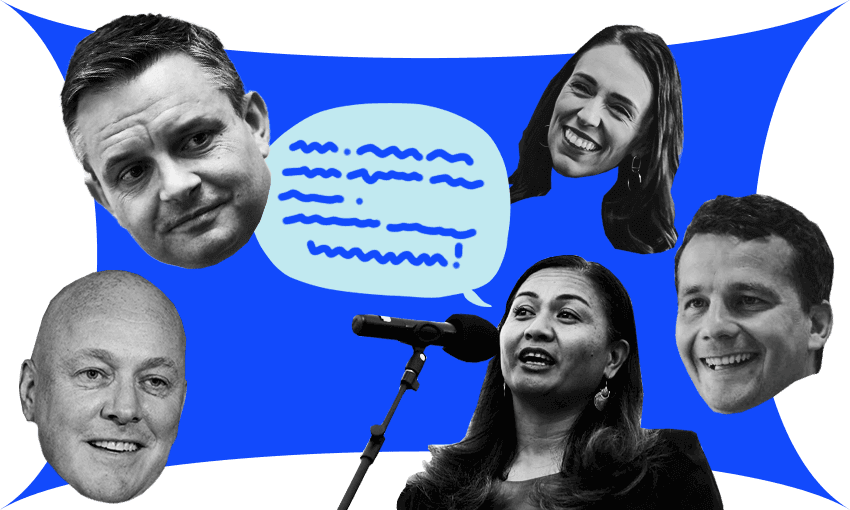A sneak preview of top NZ politicians’ scene-setting addresses, in under 200 words.
There’s no point in pretending any longer: we’re well into 2022. The first month is already history. It’s inarguably too late to chirp “happy new year” to any other sentient form. And that means, too, time for our big political beasts to roar full-voiced into the hinterland and issue their “state of the nation” speeches. In these annual addresses, the party leaders take the pulse of Aotearoa and set the scene for the year ahead. What will they say? Probably nothing, but hopefully this.
Please welcome the leader of the Labour Party and prime minister, Jacinda Ardern
I want to speak today directly to the team of five million, and also Charlotte Bellis. Last year sucked, so did the year before that, and this one will too. But we will get through it, together, with empathy and kindness. You may find that in the current climate, given the supply chain issues around the world, stocks of empathy and kindness are strained. Be assured, however, that the Ministry of Health has been in touch directly with suppliers and all available empathy and kindness has been collectivised for distribution in due course.
As many of you know I was recently designated a close contact of an omicron case. I tested relentlessly negative, but should I be unable to serve at any point in the future, Clarke will put me on speakerphone.
In conclusion, today I can tell you that we will be announcing, in the weeks to come, some critical information about just when we will be able to provide more details in regard to something that is really important, I think New Zealanders will agree, to us all, and I’m referring, of course, to a series of announcements that we’re planning to make.
Put your hands together for National boss Chris Luxon
Friends, Romans and stakeholders. Let’s circle back, drill down, reach out and touch base. What I would say to you is, actually, that’s fundamentally where we need to be. The strategy is simple: scrap MIQs and replace them with KPIs. The arc of the financial year is long, but it bends towards a positive return on investment.
What I would say to you is that fundamentally this is a team game, actually. So that’s why I’m wearing this enormous coat with my COO Nicola in this pocket and my CFO Simon in the other. What I would say to you is Judith who? And when it comes to Wikipedia, I would say this: you shouldn’t believe everything you write.
Fundamentally, actually, ask not what your country can actualise for you, but what you can actualise for your country.
It’s the co-leaders of the Green Party, Marama Davidson and James Shaw
JS: How did you get on?
MD: I got it in four.
JS: Ah, I got it in five.
MD: What do you usually start with?
JS: ALONE. You?
MD: ADIEU.
JS: Go the greens.
MD: Yeah go the greens.
Ladies and gentlemen, it’s the ACTivist himself, David Seymour
Omicron, I can’t believe it. Antigen? I’ve never met her. Kiss the bride? No thank you! Pro-vax. Anti-tax. With the groom, in the sacks. Wear a mask? Masky-mask, hoppity poppity that’s your task. Look at that, the Taliban? What! Pregnant. With possibility! Soundsplash? Backlash. Slapdash moustache. MIQ? No I’m not. Hi. Hi. Hi. Botox, barbers, bang bang bang. Gangs of DJs sweep hermit kingdom, seizing ice cream from hardworking kiwi battlers. On the potty, hi hi hi. RAT test? ACT best. Boom boom boom.
Follow The Spinoff’s politics podcast Gone By Lunchtime on Apple Podcasts, Spotify or your favourite podcast provider.





